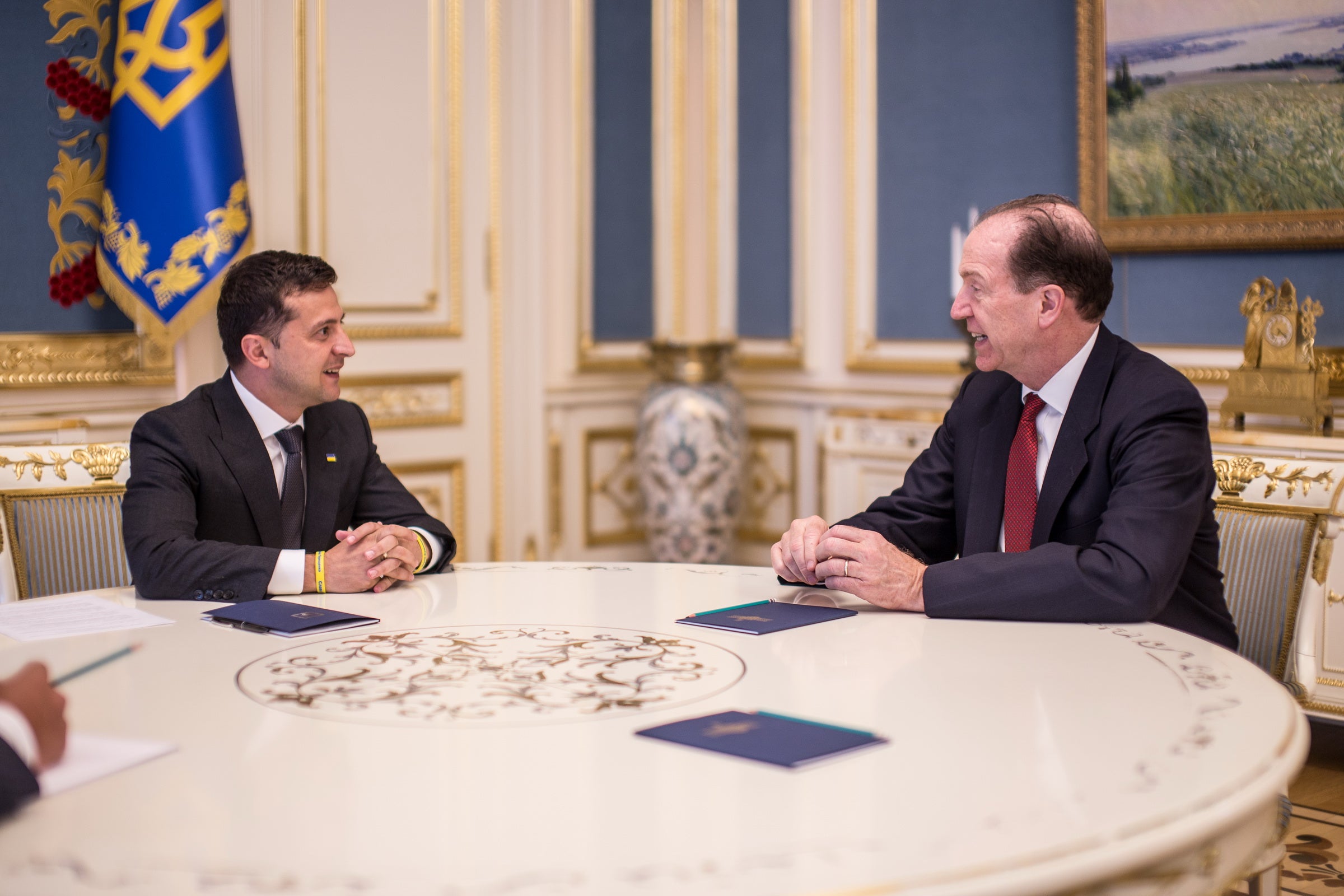 Le président ukrainien Volodymyr Zelenskyy (gauche) s'entretient avec le président du Groupe de la Banque mondiale, David Malpass en Ukraine. Photo : © Banque mondiale
Le président ukrainien Volodymyr Zelenskyy (gauche) s'entretient avec le président du Groupe de la Banque mondiale, David Malpass en Ukraine. Photo : © Banque mondiale
Ukrainians have given their new parliament and president a mandate to deliver on reforms and growth. My meetings with President Volodymyr [Zelenskyy] and other leaders in [Kyiv] last week give me optimism that policy changes are under way and will work if Ukraine can seize the moment.
The challenge is for Ukraine to adopt a new path toward faster and more sustained economic growth and higher living standards. The government is already making a firm and unified call for action, but the obstacles are formidable: monopolies in key sectors, state-owned banks that don’t want competition, ageing infrastructure, and conflict in eastern Ukraine that severely disrupts commerce and investment.
A critical first step is attracting greater investment. To do so, Ukraine will need to allow market competition, eliminate monopolies, and strengthen the rule of law. State-owned enterprises are present in almost 30 economic sectors, and hold significant market shares in more than half of the markets in which they operate.
One important area where Ukraine could strengthen competition is its natural gas sector, now dominated by a vertically integrated state monopoly. The country has committed to unbundling ownership of gas transit and production by January 1 2020. This will help attract investment and can help safeguard Ukraine’s gas transit potential.
Second, Ukraine needs more effective financial intermediation to increase private sector investment. Capital needs to be channelled to the most productive businesses rather than powerful vested interests and oligarchs. One problem has been that state-owned banks account for more than half of the banking sector, while the share of non-performing loans is more than 50 per cent. The country should introduce regulations to allow write-offs of fully provisioned NPLs and ringfence new bank managements and supervisory boards from prosecution when they properly resolve losses.
The state-owned bank law approved last year is intended to free banks from political influence by putting in independent supervisory boards. It will be critical to establish new boards quickly so they can start cleaning up NPLs and attracting private investment. Maintaining central bank regulatory independence will remain critical to boost confidence and increase foreign direct investment and credit to the private sector as Ukraine’s interest rates fall.
Third, Ukraine needs to take full advantage of the opportunities offered by its agriculture sector. The country has the largest stock of agricultural land in Europe, yet productivity per hectare is just a fraction of crop yields in France and Germany. One oligarch controls a group of companies which produces over 80 per cent of the domestic output for several varieties of mineral fertiliser.
In addition, a moratorium on agricultural land sales undermines the security of land tenure and limits the use of land as collateral to access credit.
Lifting this moratorium and establishing an efficient market for agricultural land will encourage improvements, including more investment in mechanisation and irrigation, a shift to higher value-added products, and better access to finance for smaller farms. As agriculture output increases, it will be critical to make rail transportation more effective.
In our meeting, President Zelenskyy confirmed several key growth measures, which I will reference in my meetings at the G7: to conduct land reform, unbundle the ownership of transit assets from Naftogaz, demonopolise the economy and SOEs and respect the independence of the central bank.
The strong mandate from the people provides an opportunity for the authorities to move forward swiftly, and the World Bank is determined to provide support during this critical journey toward a freer, stronger Ukraine.
This post was originally published by the Financial Times.


Join the Conversation